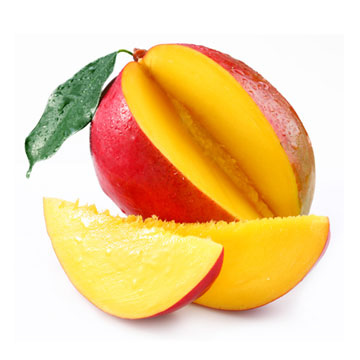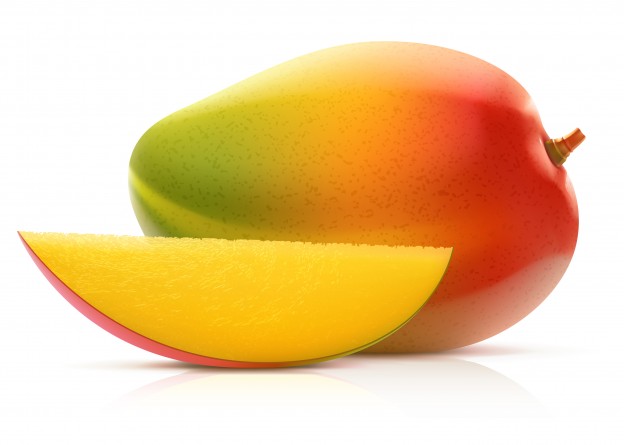By Anthoney J. Andersen – Steroidal.com
It’s the end of the long workweek, and you feel your body betraying you in a way you wouldn’t think was possible.
You muster up every ounce of energy you have to stay awake long enough to power through the last leg of the debilitating stretch of rush hour traffic.
Your eyes begin to slowly sag, like the last petal of a withering flower. You desperately need a source of vitality that will supersede this bout of exhaustion.
But what will do the trick?
What food source can be both vital to your health, while jolting your body back into coherence?
And the answer to that lies in the sweet, savory and citrus deliciousness of a mango.
THE KING OF FRUITS
Mangoes are not only an appetizing little treat for the taste buds, but they also pack a lot of essential vitamins and nutrients needed for everyday health.
Grown mainly in the tropics, this popular seasonal fruit is believed to have originated in the sub-Himalayan Plains of India.
Mangoes’ unrivaled blend of fragrance, flavor and nutritional value, makes it a popular choice among fruit lovers, who often refer to this tropical delight as the ‘king of fruits’.
According to Newhealthguide.org, the following is a list of daily nutritional values that the mango has to offer:
| Amount Per Serving(225 g)105 calories | % Daily Value |
| Vitamin C | 76 |
| Vitamin A | 25 |
| B vitamins | 11 |
| Probiotic Fiber | 9 |
| Copper | 9 |
| Potassium | 7 |
| Magnesium | 4 |
NUTRITIONAL ADVANTAGES
According to Medicalnewstoday.com, one cup of diced mango is comprised of 100 calories, one gram of protein, 0.5 gram of fat, 25 grams of carbohydrates (23 grams from sugar and three grams from fiber), 100 percent of the daily value for vitamin C, 35 percent for vitamin A, 20 percent of folate, 10 percent of vitamin B-6 and eight percent of vitamin K and potassium.
So, as you can see, just one mango a day holds many of the important vitamins and nutrients that are essential to maintaining proper health.
Consuming fruits and vegetables every day can be a difficult challenge for some people.
However, keep in mind that fruits and vegetables has longed been associated with reducing many health risks later on in life.
 According to WebMD, increasing consumption of plant foods – like mangoes – can help reduce the risk of obesity, diabetes, heart disease and maintaining high energy levels throughout the day.
According to WebMD, increasing consumption of plant foods – like mangoes – can help reduce the risk of obesity, diabetes, heart disease and maintaining high energy levels throughout the day.
The antioxidants in mangoes – fiber, pectin and vitamin C, for example – helps lower cholesterol levels, specifically low density lipoprotein (LDL) – which is the ‘bad’ cholesterol.
Mangoes can also be beneficial for individuals who are diabetic. A home remedy – which entails boiling the juice from a fresh mango – can help reduce insulin levels in the blood.
The sugar from the mango doesn’t cause a spike in a person’s blood sugar because it has a low glycemic index.
The glycemic index – or GI – was developed as a way to measure how carbohydrate-containing foods raise a person’s blood glucose. The GI is extremely beneficial in helping improve blood sugar levels in diabetics.
If you come from a family whose risk of heart disease runs high, then incorporating mangoes into your daily diet can be vital as well.
According to Medicalnewstoday.com, the fiber, potassium and vitamin content in mangoes can help stave off heart disease.
By improving your potassium intake, while decreasing the amount of sodium you ingest from certain foods (processed foods contain high levels of sodium), helps exponentially with decreasing your chances for cardiovascular disease.
THE MANGO BLEND
Picking out a good piece of fruit can be a challenging – and often times – puzzling excursion.
Not to worry, the following are a few tips on how to pick out the perfect mango, and the variety of ways you can incorporate this delicacy into your daily diet.
First off, most people immediately want to judge the ripeness of a mango on its color.
Don’t do that.
Instead, look for fresh mangoes that produce a slight yield when pressure is applied. After you have made your selection, allow them to sit out on the counter for a day or two.
Mangoes will continue to ripen at room temperature. Once ripe, wrap them in a plastic bag and store them in the refrigerator for two to three days. Mangoes can be often more enjoyable when chilled.
Once you’re ready to carve into the delicious, chilled freshness of your mango, consider these delectable options:
- One of the best ways to enjoy a mango is by simply dicing it.
- Concoct a tropical fruit salad by adding fresh papaya, pineapple and mango.
- Create a mango salad by mixing mangoes, papaya, jalapeno, red peppers and chipotle pepper. This can go great over fish tacos.
Furthermore, mangoes can be enjoyed in a plethora of ways. And since they pack a high yield when it comes to important vitamins and minerals, consider adding this ‘afternoon delight’ to any diet regimen.
Stay healthy.







